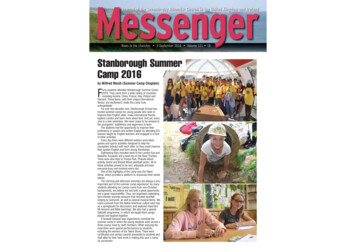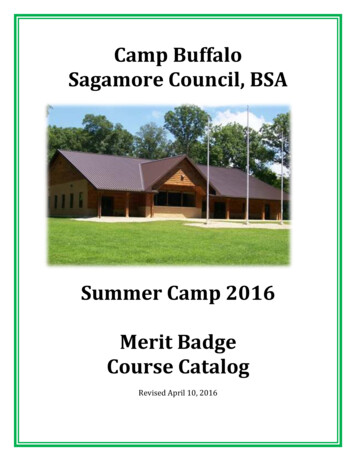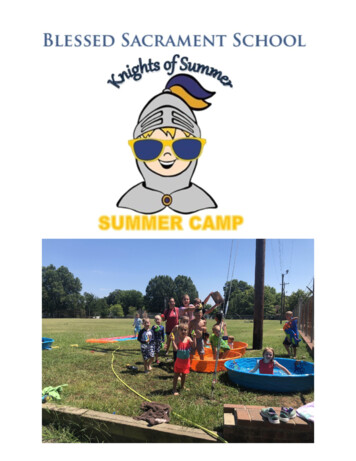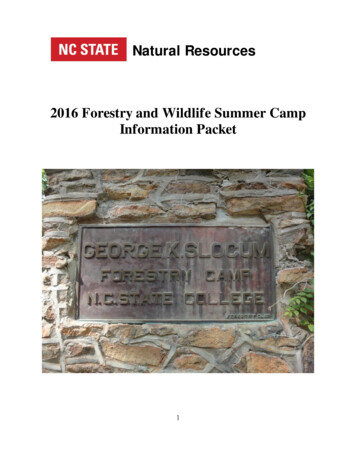
Transcription
Stanborough SummerCamp 2016by Wilfred Masih (Summer Camp Chaplain)orty students attended Stanborough Summer Camp2016. They came from a wide variety of countries,including Austria, China, France, Italy, Poland andVietnam. These teens, with their unique internationalflavour and excitement, made this camp trulyunforgettable!For over two decades now, Stanborough School hashosted summer camps for young people who wish toimprove their English skills, make international friends,explore London and learn more about God. And yet, everyyear is a new adventure. We never cease to be amazed atthe youngsters’ bubbliness and eagerness to learn.The students had the opportunity to improve theirproficiency in spoken and written English by attending EFLclasses taught by English teachers and engaged in a hostof other activities.Every day there were different outdoor and indoorgames and sports activities designed to help theyoungsters interact with each other so they could improvetheir spoken English and form strong friendships.Sightseeing trips included visits to the London Eye andMadame Tussauds and a boat trip on the River Thames.There were also trips to Thorpe Park, Phasels Woodactivity centre and Bricket Wood paintball centre. All ofthese activities proved to be very enjoyable and kepteveryone busy and involved every day.One of the highlights of the camp was the TalentShow, which provided a platform to showcase their variedtalents.The morning and afternoon worships are always a veryimportant part of the summer camp experience! As manystudents attending our camps come from non-Christianbackgrounds, we believe we had both a great opportunityand a great responsibility. Thus, we organised captivating,teen-friendly worship sessions that included heartfeltsinging by everyone, as well as special musical items. Weused a proverb from the Native American culture each dayas a springboard for discussion, and explored importantlife lessons and Bible teachings. We also had a specialSabbath programme, in which we taught them songs,played and laughed together.A farewell banquet was organised to conclude thesummer camp in which the young students were served athree-course meal by staff members. While enjoying themeal there were special performances by students,including the winners of the Talent Show. There werecertificates and various awards presented to students andstaff alike for their hard work in making this year’s campso successful.F
editorial2II am sure that you have recently seen yourquota of elite athletes pounding, pedalling orpaddling themselves to Olympic glory, for Icertainly have. There is something, however,that I have had to remind myself about whilewatching them in action. What I regard asan hour or so of exciting entertainment hascost each one of them years of strenuouspreparation. Yes, as ever, the Games providemuch food for thought.What has really fascinated me about someof these remarkable men and women is theway in which they crossed the line. Two of myfavourites in this regard have been Usain Boltand Mo Farah, both of whom won double goldat these games. Why? For the simple factthat both looked so energetic, confident andbuoyant in those milliseconds before theyrewrote athletic history. They looked likechampions as they crossed the line.The same cannot be said, however, for allwho took part in the Rio Games. Some wereobviously shocked at their results; otherswere clearly crestfallen; a few sobbed or laycrumpled on the track, utterly dejected. I feltsympathy for them – for nobody bothers totake photographs of the ‘also-rans’ or mobthem for their signatures. Their only podium,a change room bench; their only prize, theticket home!As supplied, errors and omissions exceptedChildhood obesity – the issuesIt was a favourite game of ours. On the way home from school myeldest brother and I would race to the high street bakery, press ourfaces up against the window and imagine what the luscious cakesinside would be like. That was as far as we got! Sugary foods anddrinks were not part of our daily menu and, even if we weretempted, we did not have the pocket money to purchase such‘treats’.For many families today, sugary foods and drinks are not specialoccasion ‘treats’ but part of a daily diet of junk foods. This diet andinadequate levels of physical activity are two of the factors blamedfor the rising levels of childhood obesity today. Currently the UKranks among the top five obese countries of Western Europe.1Recent Government announcements to tackle obesity includedthe following actions: Requesting the food and drink industry to cut by 5% the sugarused in products popular with children over the next year; A 20% sugar cut over the next four years, with Public HealthEngland monitoring voluntary progress; Calls on primary schools to deliver at least 30 minutes ofphysical activity a day and to help parents and carers ensurechildren get the same amount at home.However, the Government’s plans have come under attack fromdiverse quarters, including health experts, MPs, campaigners andfood chain bosses.The BBC health news of 18 August 20162 reported the followingresponses: ‘The Obesity Health Alliance – a coalition of 33 charities,medical royal colleges and campaign groups – said the planfell “disappointingly short of what is needed”.’ ‘Councillor Izzi Seccombe, of the Local Government Association,said it was “disappointing” that a number of measures that it hadcalled for – such as giving councils the power to ban junk foodadverts near schools – had not been included.’ ‘Mike Coupe, chief executive of Sainsbury’s, said the plan was a“welcome first step” ’ but added, ‘We need a holistic approach totackle childhood obesity, including compulsory measured targetsacross all nutrients – not just sugar – and mandatory traffic lightlabelling across all food and drink products, regardless of whetherthey are consumed inside or outside the home.’ TV chef and food campaigner, Jamie Oliver, observed: ‘Look atthe words used – “should, might, we encourage” – too much of itis voluntary . . . where are the mandatory points?’In the next issue we examine the challenges and solutions.Good h-37108767The winning lookIn my previous editorial I mentioned that thereare scholars who believe that Paul was wellacquainted with the Panhellenic Games ofancient Greece, and that he may haveintentionally attended the Isthmian Games atCorinth – on at least one occasion (AD 51) –in order to share the Gospel with the vastcrowds that were drawn to such events.His familiarity with the Games is clearfrom the various passages in which he makesreference to them to illustrate aspects of theChristian life. As I ponder those texts it seemslikely that he may even have watched themfrom a privileged seat near the finishing line,especially when I hear him say:‘Brothers and sisters, I do not considermyself yet to have taken hold of it. But onething I do: forgetting what is behind andstraining towards what is ahead, I press ontowards the goal to win the prize for whichGod has called me heavenwards in ChristJesus.’ (Philippians 3:13-14, NIV-UK,emphasis supplied.)He must have been close enough to seethe rhythmically pounding thighs; the thrustingarms; the bulging neck veins . . . and theutterly focused eyes as those Greek superathletes swept across the finishing line.He knew that top athletes didn’t just run tomake up numbers. They knew they could win.They were always in with a shout. He alsoknew that those top athletes had an allconsuming passion to win their chosenevents. For them, as he says below, theirswas the only race worth running.How will youcross the line?3Julian HibbertEditorHe must have been in a stadium before to know how the urging of enthusiastic spectatorsexplodes into cheers of adulation at the crossing of the line. Hence these words to the youngTimothy:‘You take over. I’m about to die, my life an offering on God’s altar. This is the only raceworth running. I’ve run hard right to the finish, believed all the way. All that’s left now is theshouting – God’s applause! Depend on it, he’s an honest judge. He’ll do right not only by me,but by everyone eager for his coming.’ (2 Timothy 4:6-8, The Message, emphasis supplied.)Paul knew the winning look. He had it too!Do you?Paul makes this observation, which is so applicable to all of us who have watched the BBCcoverage of the Rio Olympics:‘You’ve all been to the stadium and seen the athletes race. Everyone runs; one wins. Runto win. All good athletes train hard. They do it for a gold medal that tarnishes and fades. You’reafter one that’s gold eternally.’ (1 Corinthians 9:24-25, The Message, emphasis supplied.)Now that we have seen how it’s done, up close and personal, he exhorts each of us to makethe transition from spectator to sportsperson – in the race of life. It is now our turn to ‘Run towin’.It’s not all thrillsThere are spills too! The race of life isn’t for the faint-hearted. Mo Farah took a tumble duringthe 10,000m final and almost repeated it in the 5,000m heat, but winners don’t stay down. Afterthat first fall, Mo was up like a flash, regained his focus and composure, and then powered onto win the event in style. For me this is one of the hard-to-forget moments of the recent Olympics:a symbol of the sheer courage and determination top athletics requires.I have seen such courage – and more – as a church pastor. Years ago I had the ‘honour’ ofwatching one of God’s saints fade slowly away over many months. With each visit I could seehow the race of life was taking it out of her. Her body was deteriorating around her, and yet she‘ran’ on, a silent echo of Paul’s own words: ‘This is the only race worth running. I’ve run hardright to the finish, believed all the way. All that’s left now is the shouting – God’s applause!’How will you cross the line?Back in 1923, on 4 June, Frank Hayes made sports history at Belmont Park, New York State,USA, during a steeplechase – a horse race using ditches and hedges for jumps. Frank, just 35,suffered a fatal heart attack around the middle of the race, but somehow his body remained in thesaddle for at least another mile of jumps before it crossed the line to win at 20-1. Bizarre as itmay sound, ‘Hayes’ death was not discovered until Miss Frayling [the owner] and race officialscame to congratulate him shortly after the race.’1Believe it or not, Frank’s ‘record’ still stands.2 How are you planning to cross the line in ‘theonly race worth running’? I trust that you will have ‘run hard right to the finish, [and] believedall the way.’12https://en.wikipedia.org/wiki/Frank Hayes Hayes-The-Only-Dead-Man-to-Win-a-Horse-Race/
4inspirationhighlight of our holiday. It wasbeautiful.’ We never know theinfluence we have on others,when we are ‘courteous andobedient’ and ‘keep a song in ourheart’.On Thursday evening the newlyelected Trans-European Division(TED) Pathfinder director, Peter-BoBohsen, ran an incident hike, andon Sabbath afternoon offered theopportunity for a Bible Beach Artactivity while the sea was out.Thank you to the wonderfulBUC staff, new and old, and to thetwo speakers, Pastors RichieRead and Jonathan Burnett, whobetween them made appealswhich produced commitmentsfrom Pathfinders and staff to be‘Anchored’ in their faith in JesusChrist.Miracles and witnessing atBUC Camporeeby Pastor Nathan Sticklandhe British Union Conference(BUC) Pathfinder Camporeewhich finished on Saturdayevening, 6 August, was precededby a week of adventurous andvaried activities, including aday trip to some caveswhich produced witnessingopportunities, and worshipservices that led hundreds tocome forward to commit theirlives to Jesus – all at PembreyCountry Park, Wales.In the months running up tothe event some people had evenraised the question of whetherthere would be enoughPathfinders to attend thecamporee due to other eventshappening this summer. However,after an eleventh-hour rush onregistrations which tested evenexperienced leaders’ nerves,we ended up with about 800Pathfinders and staff. Seeminglythere were other attempts atscuttling the plans for thecamporee, which included certainsuppliers pulling out in the weeksbefore the camp, until a miracleof timing on the Friday before itstarted signified that the purposesof God cannot be thwarted.The marquee company, whohadn’t yet finished erecting themain marquee due to delays intheir other projects earlier inthe week, submitted a final billwith the demand of immediatepayment. This impossible requestcame after lunch on Friday whenthe BUC office had closed forthe weekend. After prayer by theadvance camp party, who hadbeen informed of the situation, itbecame clear that all things aredown to God’s timing.The BUC associate treasurerhad, for some unknown reason,delayed his departure fromWatford to attend the SwanseaChurch opening. He was phonedas he was about to reverse out ofhis drive to make the westerlyjourney, and that four-hour delaymeant he could go to the officeand authorise the payment. ButTcentenarianJohn Woodfield with his wife, Anne-Marie.Dr John Woodfield – centenarianinboxwe were unable to make contactwith the cashier who had to makethe payment. Then, remarkably,the cashier sauntered into theoffice because he had lost hishouse keys and wanted to checkif there was a spare key at theoffice! There is more to thestory, but it was a magnificentsequence of timing, and wethank God that the transactionwas made and the marqueeconstruction completed in timefor the opening ceremony.It shows that what Godintends to take place cannot beprevented.After that miracle of timing,there was a sense that nothingcould stop the Spirit of Godcaring for the camp. There wassome disappointing weather butthe Pathfinders got on with camplife. Their activities includedhonours such as Electricity,Shells, ADRA, Horse Husbandryand a new Ghanaian-basedAdinkra badge.Pastor Obinnaya Iheoma,commenting on the Sanctuaryhonour he led out in, said, ‘I havedelivered the honour at manycamporees. . . . The attitudesof the campers in attendance,especially at the Sanctuaryhonour booth, was exemplaryand I believe it to be a reflectionof the message delivered by thetwo emotive speakers, Jonathanand Richard. If all camporeeswere like this, I would do [it]again and again and encouragemore people to attend.’The adventure activitiesincluded a climbing tower, skiingand ‘doughnutting’ on the dry skislope, scooters at the skate park,canoeing, and horse riding. Acommunity service project meanta team cleaned, painted andweeded around two anchorsnear the main entrance to theeight-mile sandy beach.On the Friday of camp, 742visited the Dan-Yr-Ogof showcaves: a chance to view fromunderground the results of theFlood and natural erosion. Withso many visiting the caves itcould easily have put off othervisitors. What the Pathfindersdid not know was the influencethey were having on one visitingfamily. We have received an emailfrom a member of the public whoexpressed their praise for thegood nature and commendablebehaviour of the different groupshe spoke to. He went as far assaying, ‘I am not at all religiousbut the sound of some of yourgroups singing in the caves was aRe: Pastor Jeff Couzins’ tithearticleDear EditorPermit me to introduce myself. Myname is Tom Miller and I workedin the British Union in variouscapacities from 1961 to 1970.In that year I was called to theGeneral Conference as a directorof the Auditing Department. Iretired in 2004 and am nowresident in California. I am writingto comment on Pastor Couzins’excellent article on tithing(MESSENGER 15 July, pp. 6, 7). Hecorrectly emphasises the duty wehave, out of love, to pay an honesttithe. Nobody knows, except God,how many are following thisadmonition. The last ‘guesstimate’was 45%. That means 55% ofGod’s people are not receiving theLord’s financial blessing. PastorCouzins quotes Malachi 3:8-11.I wish he had spent longer onthe theme that we are to ‘test’ or‘prove’ God by this means. When Ibecame an Adventist at the age of20 I was as poor as a churchmouse and decided to prove Himas invited. I used to walk one milein order to save one penny andcalculated that I could not affordto pay tithe. As I was a traineechartered accountant I hadsomewhat above-average skillwith numbers. I could not affordto, but took advantage of thepromise of Malachi. And itworked! How? I don’t know, butsince then I’ve had numerousfinancial blessings.TOM MILLERn the middle of World War I, a boy was born in thecathedral town of Hereford and christened ArthurJohn. His parents, Walter and Edith Woodfield,lived over the grocer’s shop which his father Waltermanaged while his mother looked after her youngson. Her interest in health and herbal remedies ledher to a health food store in the town market whichshe was disappointed to find closed on Saturdays.When she asked why, the owner told her that shewould get the answer from meetings being held inthe city. So she attended those Adventist meetingsand was so convinced that she should keep theSabbath that she persuaded her husband and youngson to follow suit. The decision meant that Walterhad to give up his job and eventually take up sellingbooks from door to door in various English towns tosupport his family.Like so many sensitive young people, John, ashe became known, struggled to explain to his friendswhere he was on Saturdays, but he found hisAdventist community supportive. When he arrivedat Newbold Missionary College in 1933, he relaxed.‘It was heaven,’ he remembers.And so began an academic career of fifty years.After his Newbold diploma, John, studying mostlyby correspondence, worked towards a BA, an MAand finally a PhD in English Literature, all from theUniversity of London. He was only the third Newboldteacher to receive the degree since the college’sfoundation in 1901. All this while working full time,first as Head of Stanborough School in Watfordand, subsequently, for thirty years as Head of theNewbold College Department of English. For atime, in the early ’50s, he did both jobs at once,commuting between Bracknell and Watford and taking with him students from Stanborough who wereliving as members of the Woodfield family.For thirty years, as Head of Newbold’s EnglishDepartment, ‘Woody’, as he was affectionatelyknown by generations of students, taught Englishlanguage and literature, journalism, the literary studyof the Bible, and an introductory course in fine arts.Students raved about his glorious use of the Englishlanguage and reported his erudition and his dry(sometimes caustic!) wit! His Fine Arts class was sopopular it had to be offered every term.To a whole generation of Adventist preachers, heItaught homiletics with a passion. For him, theimportance of language for those who claim tobelieve in ‘the Word made flesh’ has always beencrucial. ‘I had suffered from so many bad sermonsin my life that I wanted to make sure that mystudents did better,’ he says. Dr Woodfield frequentlyoccupied the pulpit himself – for a time as pastorof the Newbold church but regularly throughout histime at Newbold, where he was a sought-afterpreacher. Always, his practice of the homiletic artsset the bar very high. Requests for copies of hissermons were frequent. His hearers wanted time tosavour the ideas and read the poetic beauty of thewords in which they were clothed.Eleven years after his retirement in 1984, Jean –his wife of 52 years and mother of his three children,Rosemary, Christopher and Elizabeth – died of asudden thrombosis. He eventually moved out ofwhat had been their family home into a tiny cottagewith a beautiful walled garden on an historic street inWokingham. He still lives there with his wife since1999 – Anne-Marie Parsons Woodfield, a retiredprimary school teacher. The couple read a poemtogether every day and take an active interest inbooks, music, politics and the wider world. Johnregularly continues to live up to his mother’sdescription: ‘Those Woodfields, always scribbling’,though now he does it on his computer, which hehas christened ‘Legion’. His memoirs already stretchto about 300 pages.On Sunday afternoon, 14 August, a month beforeJohn’s 100th birthday, about 90 people gathered forafternoon tea in Newbold’s Moor Close to celebratethe man who has enriched many of their lives ascolleague, friend, teacher and mentor. It was likebeing transported into another era. The guest listlooked like a roll-call of the families of BritishAdventist leaders from the twentieth century. Thecelebrity at the heart of the event sat resplendent inhis linen suit, his blue eyes twinkling, attentive toeveryone and everything. He showed no sign ofwilting under the warmth of the afternoon or theattention showered upon him. He cut his cake andposed for pictures with panache. He had evenwritten 20 witty lines of poetry for the occasion.Renaissance man, Arthur John Woodfield, we giveHELEN PEARSONthanks for you. We salute you!5
6perspective‘There’s asermon aboutthat . . .’‘Oh . . . ,not again!’‘There’s asermon aboutthat . . .’Communicate your faith. . . effectivelyby Pastor Richard Daly, British Union ConferenceCommunication and Media DirectorAlexander Douglas shares his views on a matter thatcertainly deserves more discussion within our churchin the British Union Conference.he title of this articleowes part of its origin to aconversation I had with ayoung BUC church member at arecent camp meeting. This issomeone who was not borninto or raised in an Adventistenvironment. In response to myquestions about the level andnature of support they werereceiving from members of theirpeer group, this young memberresponded by saying that whencertain questions are asked, thedefault response is, ‘There’s asermon about that . . .’This is but one manifestationof a deeper malaise that is nowso intrinsic to the reality of ourAdventist church life here inBritain, that when you actuallythink for yourself and expressthose thoughts, you risk eithera) becoming unpopular or b)becoming more unpopular thanyou already are.Think through this with mefor a moment: if you ask a fellowchurch member about an elementof some article of our faith andthis church member refers you toa sermon that somebody else haspreached, that is obviously not abad thing. If the second time youseek such clarification from eitherthe same or a different churchmember, and they refer you to adifferent sermon, then that still isnot necessarily a bad thing: butwhat if it continues to be the casethat every time certain questionsget asked the only response isa referral to someone else’spre-packaged words? Surely thenit is not unreasonable to concludethat, when it comes to certainimportant questions, local churchmembers generally do not havethe capacity – or even theprerogative – to be able to sitdown with those who ask thesequestions and share their ownT(studied) responses with them.(I say ‘responses’ becausesometimes a question does notactually have an answer . . . !)Here within UK Adventism ittends to be ‘celebrity Adventists’– who are usually American –who form the locus points*of our references. This is alsohaving the harmful effect of tellingboth prospective and currentAdventists that the Seventh-dayAdventist faith is in fact a NorthAmerican one and so it is goingto be American thinkers (male,female, black, white, old, young)upon whom we must depend tobe sure that we have understoodour Adventist identity properly.Speaking as a South AmericanCaribbean of African heritage andAnglo-European education, I havereally enjoyed my opportunitiesto engage with US scholars inmore than one discipline: but itis precisely this ongoingengagement that tells me thatthe North American vanguardof thought cannot possibly holdanswers to Anglo-Europeanquestions as a matter of course.Over the years certain ideasabout history, culture and religionhave travelled out of Americanacademic enclaves into thewider social (English-speaking)mainstream. They are celebratedas ‘American’ innovations ofthought, but the reality is thatthese (genuinely important) ideaswould not and could not existwithout the work of certainEuropean thinkers who wentbefore. So if you are a Seventhday Adventist living in the UKand trying to take the messageto Anglo-European society (whoare the cultural minority in ourchurches), it surely matters thatyou have an understanding ofhow Anglo-European people think– because they will not have thecommunicationn the last edition we looked at the personalresponsibility God has privileged all of us with:that of sharing our story. Your personal story isabout the good things Christ has done for you andthe reasons why you love and trust Him. You areto become a personal ‘brand’ in order to convey aclear message to those in your domain – friends,colleagues and even those with whom you haveone-off encounters.Among the key things commercial companiesdo when looking to promote their products is a lotof market research, product analysis, consumersurveys and predictive trending. The top brandingcompanies go one step further: they define thenext big thing that will happen; they create ‘gamechangers’ in existing markets before peoplethemselves even know what they want. The bottomline is that effective results are determined bycommunicating the product effectively, and thereought to be no difference when communicatingyour personal message of faith.Isame cultural presuppositions asNorth Americans! So if you neverreally get to know people inAnglo-European society outside‘work’ or ‘education’ then you willstruggle to have any real idea ofhow such people think.If – in addition to the above –every single idea and conceptyou possess about evangelismis dependent on the thinking ofNorth American Adventists –who themselves are likely to beculturally and intellectually adriftof what happens here in AngloEurope – then we have theunedifying situation in which aperson lives in Anglo-Europe butexists in an SDA subculture inwhich Americans teach Britonsabout how to reach AngloEuropeans when they themselveshave an insufficient grasp of theincreasing ways in which thesecular Anglo-European critiqueof Christianity is developing. Thisis why we have seen a significantnumber of British-basedgraduates of ARISE (LightBearers), AFCOE (Amazing FactsCentre of Evangelism) and othersimilar institutions struggle tomake an evangelistic impact onBritish society – because thetools that they have been givenreally do work much better in theUSA than could ever be possiblein the UK.And with both evangelical andPentecostal churches here inBritain now working overtime towelcome more diverse membersof society into their churchcommunities (I speak fromexperience), the fact that wecontinue to struggle with culturalintegration in our Adventistchurches is one of the biggestreasons why our wider witnessto British society cannot be anymore successful than it is.Anglo-Europeans are morethan happy to appropriatecertain exported ‘Americanisms’(courtesy of TV and film), butthey will almost always retaintheir right to think as AngloEuropeans. In this regard theyare (usually) unwitting heirs to aprofound tradition of what I call‘sceptical-liberal’ frameworks ofthought. This usually means that,when faced with a Seventh-dayAdventist who can only reply totough questions with ‘soundbites’, ‘quotations’ and ‘sermonlinks’, they are not at all likely tobe inspired to think rigorouslythrough their own sceptical-liberalpresuppositions. This in turnmeans that the process by whichthey might eventually confessJesus Christ as Lord becomesexponentially more difficult.Historically, many Adventistshave been baptised because ofSeventh-day Adventist churchmembers, but those who haveremained have done so despiteSeventh-day Adventist churchmembers! In these last days wehave no authority from eitherScripture or Ellen White to allowothers (however gifted andanointed they may or may not be)to do our ‘Adventist’ thinking forus. For that reason this diseaseof ‘sermon-promotion’ thatmasquerades as a spiritual actionmay actually be a cover fortheological laziness.This is one way in which onecan see that in these last daysmany who make their way intothe Seventh-day Adventist Churchwill in fact do so despite thechurch members (too many ofwhom have not even necessarilyunderstood the sermons that theyare busy promulgating) – and notbecause of the church members.Being able to explainsomething to someone else inyour own words could not bemore important in terms of‘keeping it real’. Yes, there maybe a hundred sermons about that,but what if your questioner onlyhas ears for your words –because they actually know you,and (hopefully) trust you? Canwe afford to let others speakfor us at the risk of eventuallycompletely losing the ability tospeak – and, indeed, to think –for ourselves?* A locus of points is the set of points,and only those points, that satisfies givenconditions.Here are some principles to apply as you do so:1. Believe your message. It’s not about howeloquent you are, but people are drawn to someonewho speaks with conviction. In Mark 1:21, 22 (KJV)Jesus ‘went into Capernaum; and straightway on thesabbath day he entered into the synagogue, andtaught. And they were astonished at his doctrine: forhe taught them as one that had authority, and not asthe scribes.’Our primary example in the Christian life is JesusChrist Himself. Notice that the people could tellthe difference in the way He taught. He spoke withauthority. He spoke like He actually believed in andunderstood the message He was communicating.This is the way we are to speak.Many Christians do not speak convincinglybecause they don’t even know what they believe.You cannot effectively communicate what you havenot personally experienced. That’s why your story isunique and personal to you. Express yourself withthe unwavering confidence that, because Christ isreal to you and has m
summer camp in which the young students were served a three-course meal by staff members. While enjoying the meal there were special performances by students, including the winners of the Talent Show. There were certificates and various awards presented to students and staff alike for their hard work in making this year's camp so successful.









